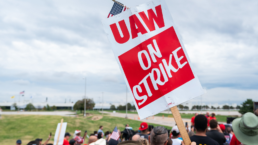Automakers rely on non-union plants in the South to drive down wages across the country. A UAW victory in Tennessee and an upcoming vote in Alabama could change that.
by Marc Bayard and Dev Wakeley, Otherwords
The United Auto Workers recently scored the largest union victory in decades in the South. Their success at a Tennessee Volkswagen plant could be a turning point for labor in a region long known for governmental hostility to unions.
The next test will be a UAW election scheduled for the week of May 13 at a Mercedes-Benz factory in Alabama, a state that has attracted so much auto investment it has earned the nickname “the Detroit of the South.”
If the roughly 5,000 Mercedes workers vote to unionize, the ripple effects could empower workers nationwide.

For decades, Southern states have pursued “low-road” development strategies, luring investors with massive public subsidies and repressive labor policies. This has pitted workers across the country against each other, undercutting everyone’s ability to secure fair compensation.
Alabama has spent $1.6 billion to woo Mercedes, along with Toyota, Hyundai, and Honda. All these foreign companies’ operations in the South are non-union, in contrast to the unionized Big Three of Ford, GM, and Stellantis.
This foreign investment has created thousands of Alabama jobs — but with weak worker protections, the state remains one of the nation’s poorest. And while these companies have enjoyed rising corporate profits, they have left workers behind.
Recent Posts
“Arrest Now, Ask Questions Later”: Why Did L.A. ICE Agents Arrest and Jail U.S. Citizen Andrea Velez?
July 3, 2025
Take Action Now “They didn’t have vests that said ICE or anything. Their cars didn’t have license plates. … Just because of the color of our…
Trump’s Big, Beautiful Bill Is Naked Class War
July 3, 2025
Take Action Now Trump’s “Big, Beautiful Bill” trades tax cuts on millionaires for the dissolution of society.By Hamilton Nolan, In These Times…
Mayor Mamdani’s First Day, A Zero Hour Conversation With Richard Wolff
July 2, 2025
Take Action Now If elected, what would Mayor Mamdani do on his first day in City Hall? How would a democratic socialist govern as a big-city mayor?……
The U.S. Is Funding A Bloodbath At Gaza Aid Centers
July 2, 2025
Take Action Now The admin just gave $30M to GHF, the organization at the center of charges that Israel is weaponizing assistance and shooting at…




